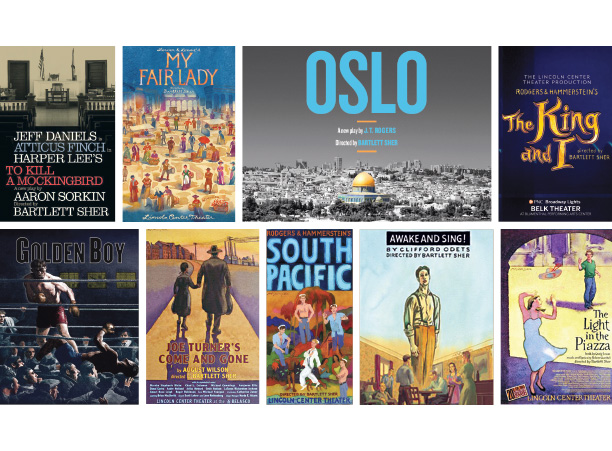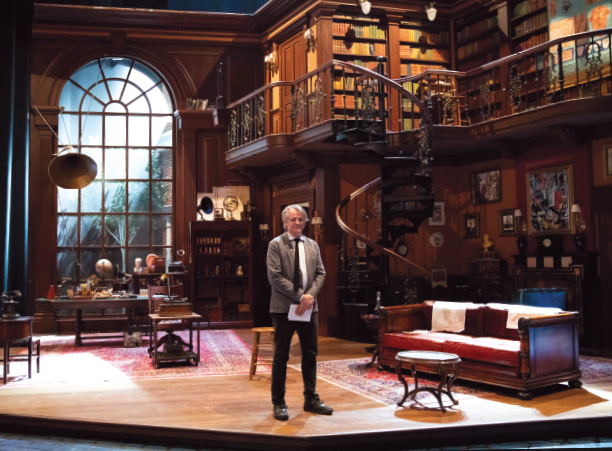
It's really hard to say what the national narrative is anymore," says Tony Award-winning director Bartlett Sher '81, "but one thing you can almost be certain of is every eighth-grader in the United States is probably going to read 'To Kill a Mockingbird.'"
Harper Lee's 1961 Pulitzer Prize winner is now a Broadway play, and the adaptation joins an elite roster of classics ("South Pacific," "My Fair Lady," "Fiddler on the Roof" and "The King and I") Sher has directed for modern audiences who — in witnessing the events of a fictional Maycomb, Alabama — may confront their own very real nation that's wrestling with parallel issues of race, class and gender.
Sher, an English major at Holy Cross, is a master of mounting works that challenge perceptions, subvert expectations and tackle prejudices, which is an especially ardent effort today as theater becomes an increasingly necessary medium for reflection and perspicacity.
"As our technology changes, and as we change, theater's one of the few remaining community experiences where people who might not agree with each other come into the same place and hear the same story," notes Sher, who won a 2008 Tony Award for his direction of "South Pacific" and has been nominated an additional eight times.
In response to today's fractured political climate, audiences can come together out of a hunger to be comforted. As such, some new plays simply affirm an audience's views instead of fostering rigorous dialogue about our complex world. To engender forward-thinking conversations that push boundaries and perspectives through his shows, Sher notes, "We're not doing utopian theater-making — we're not creating a version of the world we want to live in. We have to reflect the world we are actually living in, and that world is complicated and messy and full of weird contradictions."
To that end, he uses — and has used, throughout his career — storytelling as a vehicle to continue exploring questions instead of providing easy solutions.
 Sher has been Tony-nominated for his direction of all the above productions, the most recent being this year for "To Kill a Mockingbird.”"
Sher has been Tony-nominated for his direction of all the above productions, the most recent being this year for "To Kill a Mockingbird.”""There's no way to look at that story without asking who Eliza Doolittle would be today and what that ending would be — and that's not a question I can answer by myself," Sher says. "It's something I answer with Lauren Ambrose [who received a Tony Award nomination for her portrayal of Eliza] and ask of all my collaborators as we're building the work. It's a consistent question; you always have to ask, 'Why am I doing this particular piece, especially for a revival or a great classical work, at this time in history?'"
In perhaps the revival's most striking shift, Sher had Eliza enter the audience and ascend the theater's stairs in the musical's final moments. Is she staying with Henry Higgins, the phonetics professor who berated her lower-class dialect — as implied in the original 1956 production and 1964 movie — or abandoning him?
"When she goes up into the house, she goes into the future. That music is so big at the end, so I tried to use it to bring her out and into the world," Sher says.
Timely issues similarly informed Sher's latest Broadway smash "To Kill a Mockingbird," which, since its December 2018 opening, has become the top-grossing American play in Broadway history. Supreme Court nomination hearings for then-nominee Brett Kavanaugh were being held at the same time as the play's rehearsals. "I brought in some specialists on legal matters regarding sexual assault and the position of women," Sher says of the play's rehearsal process.
Gender, class and race are the tools in Lee's seminal book that inform "the moral education of children and how they learn about justice," as Sher says, and though published 59 years ago, the novel becomes topical anew as Alabama contends with women's reproductive rights, economic instability and racial tensions.
Still, that doesn't mean the central story needs to be set in 2019 to make the narrative resonate. "We're not pretending it's now, we're pretending it's Scout's perspective on her community from 1958 looking back to 1934 and what she had experienced," Sher explains. "We tried to make sense of that world. And then the audience has the chance to make the comparison of where they feel they are with their own history."
 Sher on stage in Prof. Henry Higgins’ living room at "My Fair Lady," a musical originally based on George Bernard Shaw’s 1913 play "Pygmalion." Photo by Avanell Brock
Sher on stage in Prof. Henry Higgins’ living room at "My Fair Lady," a musical originally based on George Bernard Shaw’s 1913 play "Pygmalion." Photo by Avanell BrockIn the novel — and its Academy Award-winning 1962 film adaptation — some of Atticus' features mirror those of a "white savior," with those questionable traits then exacerbated in Lee's 2015 "Go Set a Watchman," which divulged a bigoted side to Atticus. His credo that all people are inherently good and deserving of respect maims Calpurnia, who notes that such beliefs are easy to feel when coming from someone more protected by privilege and not impacted by systematic oppression.
"Aaron is brave enough to have Calpurnia challenge Atticus," Sher says. "The myth that somehow the white man is going to save these 'poor people' is something we directly try to address with this story."
Much like considering a modern Eliza, Sher had to create a more well-rounded version of Atticus: "We get to this novel in 2019 and we have to stay respectful of the original work, but we also have to ask questions. One of the primary questions was who Atticus Finch was: Can he be a person who can't take a side? Doesn't he have to take a side? That's what happens when you get different iterations over time. You're having a conversation with your past, your present, with your colleagues, and all of that goes into making a relevant and contemporary piece of theater."
And this collaborative nature of theater — and the shared experience with an audience — can unite different groups of people. Such is the case for "To Kill a Mockingbird," which is attracting audiences from different areas of the country.
"Harper Lee grew up in Monroeville, Alabama, but she lived in New York half her life," Sher says. "So one of the other issues besides race and class that's incredibly important is region. Lee is dealing with the differences between the North and the South, so we have lots of audience members come in from all over the country, especially the South, as they're excited and honored to see their region getting represented on Broadway and feeling it's part of their history."
This communion is one of theater's most extraordinary and rewarding elements: "The theater is one of the only places where a group of people actually have to be in the same room, watching the same event, at the same time," Sher says. As the ways in which we consume art evolve, plays continue to demand attention with their immediacy and craft. And, as such, he adds: "Theater is becoming more and more unique."
Written by Billy McEntee for the Summer 2019 issue of Hole Cross Magazine.
About Holy Cross Magazine Holy Cross Magazine (HCM) is the quarterly alumni publication of the College of the Holy Cross. The award-winning publication is mailed to alumni and friends of the College and includes intriguing profiles, make-you-think features, alumni news, exclusive photos and more. Visit magazine.holycross.edu/about to contact HCM, submit alumni class notes, milestones, or letters to the editor.
Related Information

